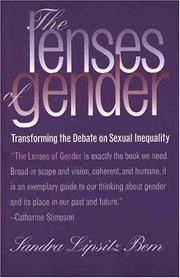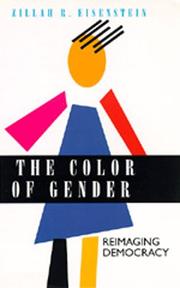| Listing 1 - 4 of 4 |
Sort by
|

ISBN: 1280032383 0203288009 9786610032389 1134860978 0203204093 9780203204092 9780415097611 0415097614 9780415097628 0415097622 0415097614 0415097622 6610032386 9781134860920 9781134860968 9781134860975 113486096X Year: 1994 Publisher: London New York Routledge
Abstract | Keywords | Export | Availability | Bookmark
 Loading...
Loading...Choose an application
- Reference Manager
- EndNote
- RefWorks (Direct export to RefWorks)
Men --- Sexism --- Feminism --- Emancipation of women --- Feminist movement --- Women --- Women's lib --- Women's liberation --- Women's liberation movement --- Women's movement --- Social movements --- Anti-feminism --- Sex bias --- Attitude (Psychology) --- Prejudices --- Sex (Psychology) --- Social perception --- Sex role --- Human males --- Human beings --- Males --- Effeminacy --- Masculinity --- Psychology --- Attitudes --- Emancipation

ISBN: 0585352585 9780585352589 9780300154252 0300154259 9780300061635 0300061633 0300056761 9780300056761 Year: 1994 Publisher: [Place of publication not identified] Yale University Press
Abstract | Keywords | Export | Availability | Bookmark
 Loading...
Loading...Choose an application
- Reference Manager
- EndNote
- RefWorks (Direct export to RefWorks)
In this book a leading theorist on sex and gender discusses how hidden assumptions embedded in our cultural discourses, social institutions, and individual psyches perpetuate male power and oppress women and sexual minorities. Sandra Lipsitz Bem argues that these assumptions, which she calls the lenses of gender, shape not only perceptions of social reality but also the more material things-like unequal pay and inadequate daycare-that constitute social reality itself. Her penetrating and articulate examination of these hidden cultural lenses enables us to look at them rather than through them and to better understand recent debates on gender and sexuality.According to Bem, the first lens, androcentrism (male-centeredness), defines males and male experience as a standard or norm and females and female experience as a deviation from that norm. The second lens, gender polarization, superimposes male-female differences on virtually every aspect of human experience, from modes of dress and social roles to ways of expressing emotion and sexual desire. The third lens, biological essentialism, rationalizes and legitimizes the other two lenses by treating them as the inevitable consequences of the intrinsic biological natures of women and men.After illustrating the pervasiveness of these three lenses in both historical and contemporary discourses of Western culture, Bem presents her own theory of how the individual either acquires cultural gender lenses and constructs a conventional gender identity or resists cultural lenses and constructs a gender-subversive identity. She contends that we must reframe the debate on sexual inequality so that it focuses not on the differences between men and women but on how male-centered discourses and institutions transform male-female difference into female disadvantage.
Gender & Ethnic Studies --- Social Sciences --- Gender Studies & Sexuality --- Sex role. --- Sex differences (Psychology) --- Sexism. --- Equality. --- Gender identity. --- Sex identity (Gender identity) --- Sexual identity (Gender identity) --- Identity (Psychology) --- Sex (Psychology) --- Queer theory --- Egalitarianism --- Inequality --- Social equality --- Social inequality --- Political science --- Sociology --- Democracy --- Liberty --- Sex bias --- Attitude (Psychology) --- Prejudices --- Social perception --- Sex role --- Gender role --- Social role --- Gender expression --- Sexism --- Gender roles --- Gendered role --- Gendered roles --- Role, Gender --- Role, Gendered --- Role, Sex --- Roles, Gender --- Roles, Gendered --- Roles, Sex --- Sex roles

ISBN: 2707811785 9782707811783 Year: 1994 Publisher: Paris : Nizet,
Abstract | Keywords | Export | Availability | Bookmark
 Loading...
Loading...Choose an application
- Reference Manager
- EndNote
- RefWorks (Direct export to RefWorks)
Gebruiksaanwijzing bij het vervrouwelijken van de (franse) taal. Niedzwiecki geeft een aantal methoden en regels om (mannelijke en neutraal-vrouwelijke) beroepsnamen, graden, titels en functies enz..., om te zetten naar vervrouwelijkte equivalenten.
French language --- Women --- Sexism --- Feminism --- Français (Langue) --- Femmes --- Sexisme --- Gender. --- Language. --- Genre --- Langage --- Language --- Gender --- -French language --- -Sexism --- -Women --- -804.0 --- Féminisme Vrouwenemancipatie --- Vocabulaire (français) Woordenschat (Frans) --- Communication (langue française) Communicatie (Franse taal) --- Langage Taalgebruik --- Human females --- Wimmin --- Woman --- Womon --- Womyn --- Females --- Human beings --- Femininity --- Sex bias --- Attitude (Psychology) --- Prejudices --- Sex (Psychology) --- Social perception --- Sex role --- Langue d'oïl --- Romance languages --- Emancipation of women --- Feminist movement --- Women's lib --- Women's liberation --- Women's liberation movement --- Women's movement --- Social movements --- Anti-feminism --- Emancipation --- Seksisme in de taal --- Sexism in language --- Sexisme dans le langage --- Sociolinguistics --- Sociology of occupations --- Belgium --- Français (Langue) --- Français (langue) --- Lexicologie. Semantiek --- Franse taalkunde --- Lexicology. Semantics --- 804.0 --- Language and languages --- Sex differences --- taalgebruik --- vrouwenemancipatie --- Sexism - Language --- French language - Gender --- Women - Language --- Feminism - Language --- NOMS DE METIER, FONCTION, GRADE OU TITRE --- FEMINISATION --- Language use --- Professions --- Book

ISBN: 0520914384 0585229643 9780520914384 9780585229645 0520083385 9780520083387 0520084225 9780520084223 Year: 1994 Publisher: Berkeley : University of California Press,
Abstract | Keywords | Export | Availability | Bookmark
 Loading...
Loading...Choose an application
- Reference Manager
- EndNote
- RefWorks (Direct export to RefWorks)
In this provocative volume, Zillah Eisenstein uncovers the hidden sexual and racial politics of the past decade. Beginning where she left off in her award-winning book The Female Body and the Law, Eisenstein takes the reader on a feminist-inspired road trip, traveling from the thicket of recent abortion decisions to the revolutions of 1989 to the murky chambers of the Anita Hill/Clarence Thomas hearings. Along the way, she enunciates a wholly original conception of individual privacy and sexual rights. Eisenstein brings a range of topics to her discussion: the L.A. riots, crack babies, Murphy Brown, political correctness, the 1992 presidential election, the Gulf War. She seeks to redirect our thinking about democracy away from universal conceptions that mask racial and gender oppression to the specific realities of women and people of color. A respect for multiple differences--as represented in the needs of women of color and their bodies--is, she says, essential to inclusive universal rights. Reproductive freedoms and sexual equality, not abstract notions of civil liberties, provide the wellsprings of a meaningful democratic life. Using this perspective to evaluate the Eastern European revolutions of 1989, Eisenstein finds that the separation between their ideals and the reality of the market system illustrates the failings of democratic theory, especially for women. Eisenstein's controversial arguments will provoke a rethinking of what race and gender mean today.
Sexism. --- Racism. --- Patriarchy. --- Democracy. --- Feminism. --- Emancipation of women --- Feminist movement --- Women --- Women's lib --- Women's liberation --- Women's liberation movement --- Women's movement --- Self-government --- Androcracy --- Patriarchal families --- Bias, Racial --- Race bias --- Race prejudice --- Racial bias --- Sex bias --- Emancipation --- Social movements --- Anti-feminism --- Political science --- Equality --- Representative government and representation --- Republics --- Fathers --- Families --- Male domination (Social structure) --- Patrilineal kinship --- Prejudices --- Anti-racism --- Race relations --- Attitude (Psychology) --- Sex (Psychology) --- Social perception --- Sex role --- Critical race theory --- Political philosophy. Social philosophy --- Ethics of family. Ethics of sexuality --- Sociology of minorities --- Sociology of the family. Sociology of sexuality --- Social policy --- Political systems --- Infectious diseases. Communicable diseases --- Gynaecology. Obstetrics --- Eastern and Central Europe --- United States --- United States of America --- Feminism --- Aids --- Liberalism --- Government policy --- Patriarchy --- Racism --- Book --- Abortion --- Democracy
| Listing 1 - 4 of 4 |
Sort by
|

 Search
Search Feedback
Feedback About
About Help
Help News
News